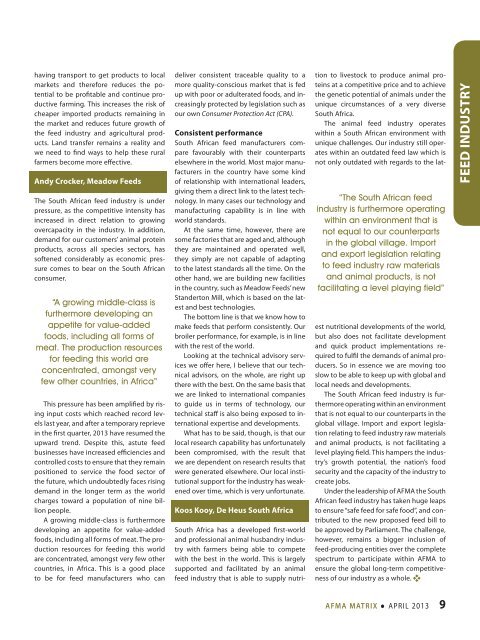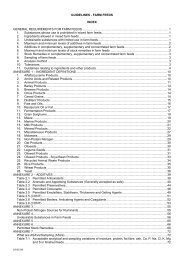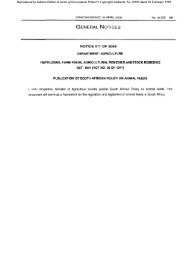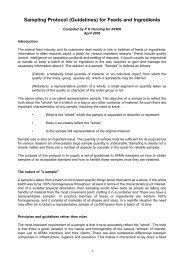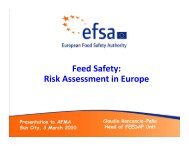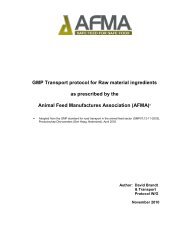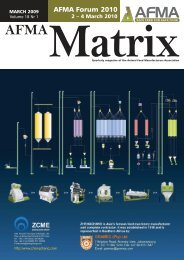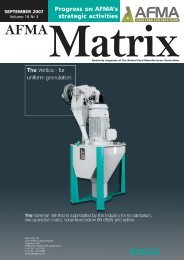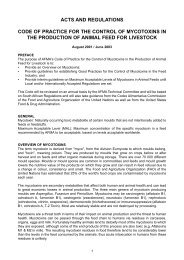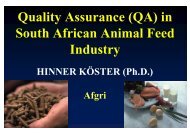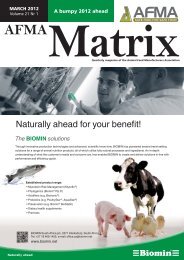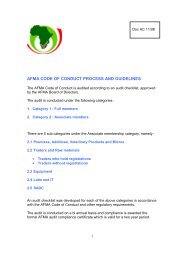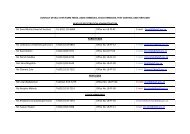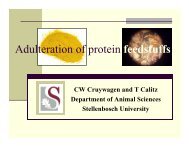Create successful ePaper yourself
Turn your PDF publications into a flip-book with our unique Google optimized e-Paper software.
having transport to get products to local<br />
markets and therefore reduces the potential<br />
to be profitable and continue productive<br />
farming. This increases the risk of<br />
cheaper imported products remaining in<br />
the market and reduces future growth of<br />
the feed industry and agricultural products.<br />
Land transfer remains a reality and<br />
we need to find ways to help these rural<br />
farmers become more effective.<br />
Andy Crocker, Meadow Feeds<br />
The South African feed industry is under<br />
pressure, as the competitive intensity has<br />
increased in direct relation to growing<br />
overcapacity in the industry. In addition,<br />
demand for our customers’ animal protein<br />
products, across all species sectors, has<br />
softened considerably as economic pressure<br />
comes to bear on the South African<br />
consumer.<br />
“A growing middle-class is<br />
furthermore developing an<br />
appetite for value-added<br />
foods, including all forms of<br />
meat. The production resources<br />
for feeding this world are<br />
concentrated, amongst very<br />
few other countries, in Africa”<br />
This pressure has been amplified by rising<br />
input costs which reached record levels<br />
last year, and after a temporary reprieve<br />
in the first quarter, <strong>2013</strong> have resumed the<br />
upward trend. Despite this, astute feed<br />
businesses have increased efficiencies and<br />
controlled costs to ensure that they remain<br />
positioned to service the food sector of<br />
the future, which undoubtedly faces rising<br />
demand in the longer term as the world<br />
charges toward a population of nine billion<br />
people.<br />
A growing middle-class is furthermore<br />
developing an appetite for value-added<br />
foods, including all forms of meat. The production<br />
resources for feeding this world<br />
are concentrated, amongst very few other<br />
countries, in Africa. This is a good place<br />
to be for feed manufacturers who can<br />
deliver consistent traceable quality to a<br />
more quality-conscious market that is fed<br />
up with poor or adulterated foods, and increasingly<br />
protected by legislation such as<br />
our own Consumer Protection Act (CPA).<br />
Consistent performance<br />
South African feed manufacturers compare<br />
favourably with their counterparts<br />
elsewhere in the world. Most major manufacturers<br />
in the country have some kind<br />
of relationship with international leaders,<br />
giving them a direct link to the latest technology.<br />
In many cases our technology and<br />
manufacturing capability is in line with<br />
world standards.<br />
At the same time, however, there are<br />
some factories that are aged and, although<br />
they are maintained and operated well,<br />
they simply are not capable of adapting<br />
to the latest standards all the time. On the<br />
other hand, we are building new facilities<br />
in the country, such as Meadow Feeds’ new<br />
Standerton Mill, which is based on the latest<br />
and best technologies.<br />
The bottom line is that we know how to<br />
make feeds that perform consistently. Our<br />
broiler performance, for example, is in line<br />
with the rest of the world.<br />
Looking at the technical advisory services<br />
we offer here, I believe that our technical<br />
advisors, on the whole, are right up<br />
there with the best. On the same basis that<br />
we are linked to international companies<br />
to guide us in terms of technology, our<br />
technical staff is also being exposed to international<br />
expertise and developments.<br />
What has to be said, though, is that our<br />
local research capability has unfortunately<br />
been compromised, with the result that<br />
we are dependent on research results that<br />
were generated elsewhere. Our local institutional<br />
support for the industry has weakened<br />
over time, which is very unfortunate.<br />
Koos Kooy, De Heus South Africa<br />
“The South African feed<br />
industry is furthermore operating<br />
within an environment that is<br />
not equal to our counterparts<br />
in the global village. Import<br />
and export legislation relating<br />
to feed industry raw materials<br />
and animal products, is not<br />
facilitating a level playing field”<br />
South Africa has a developed first-world<br />
and professional animal husbandry industry<br />
with farmers being able to compete<br />
with the best in the world. This is largely<br />
supported and facilitated by an animal<br />
feed industry that is able to supply nutrition<br />
to livestock to produce animal proteins<br />
at a competitive price and to achieve<br />
the genetic potential of animals under the<br />
unique circumstances of a very diverse<br />
South Africa.<br />
The animal feed industry operates<br />
within a South African environment with<br />
unique challenges. Our industry still operates<br />
within an outdated feed law which is<br />
not only outdated with regards to the latest<br />
nutritional developments of the world,<br />
but also does not facilitate development<br />
and quick product implementations required<br />
to fulfil the demands of animal producers.<br />
So in essence we are moving too<br />
slow to be able to keep up with global and<br />
local needs and developments.<br />
The South African feed industry is furthermore<br />
operating within an environment<br />
that is not equal to our counterparts in the<br />
global village. Import and export legislation<br />
relating to feed industry raw materials<br />
and animal products, is not facilitating a<br />
level playing field. This hampers the industry’s<br />
growth potential, the nation’s food<br />
security and the capacity of the industry to<br />
create jobs.<br />
Under the leadership of <strong>AFMA</strong> the South<br />
African feed industry has taken huge leaps<br />
to ensure “safe feed for safe food”, and contributed<br />
to the new proposed feed bill to<br />
be approved by Parliament. The challenge,<br />
however, remains a bigger inclusion of<br />
feed-producing entities over the complete<br />
spectrum to participate within <strong>AFMA</strong> to<br />
ensure the global long-term competitiveness<br />
of our industry as a whole.<br />
<br />
Feed industry<br />
<strong>AFMA</strong> MATRIX ● APRIL <strong>2013</strong> 9


